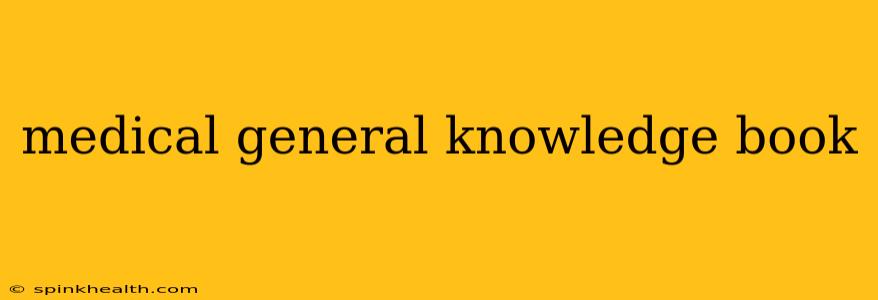Ever wished you had a handy reference for understanding common medical terms and concepts? This isn't a medical textbook; it's a friendly guide designed to empower you with essential medical general knowledge, making navigating healthcare discussions and decisions easier. Think of it as your trusty companion on the journey to understanding your own health and the health of those around you.
What is a medical general knowledge book, and why should I care?
A medical general knowledge book, like this guide, acts as a bridge between complex medical terminology and everyday understanding. It's not about replacing your doctor—it's about equipping you to participate more effectively in your healthcare. Understanding basic concepts can help you ask better questions, interpret medical advice, and make informed decisions about your well-being.
What are the different types of medical general knowledge books?
There's a diverse landscape of books aimed at improving your medical literacy. Some focus on specific conditions (like heart disease or diabetes), others delve into general anatomy and physiology, while others emphasize practical first aid and emergency procedures. The best type for you depends on your needs and interests. This guide focuses on the foundational elements useful for everyone.
What are some common medical terms and their meanings?
Let's unravel some frequently encountered medical jargon. This section is just a taste; a full medical general knowledge book would cover many more.
- Symptom: A subjective experience reported by the patient (e.g., headache, fatigue).
- Sign: An objective finding detected by a healthcare professional (e.g., elevated blood pressure, rash).
- Diagnosis: The identification of a disease or condition.
- Prognosis: A prediction of the likely course and outcome of a disease.
- Treatment: Medical care given to cure, relieve, or prevent disease.
How can I learn basic medical terminology?
Learning medical terminology might seem daunting, but it's easier than you think. Start with the basics—prefixes, suffixes, and root words—many medical terms are built from these components. For example, "cardio" (heart) + "vascular" (blood vessels) = cardiovascular. Flashcards, online resources, and dedicated medical terminology books can all be helpful.
What are some good resources for learning medical general knowledge?
Beyond this guide, several resources can enhance your understanding. Reputable websites (check for .gov or .org extensions), medical dictionaries, and well-regarded health books authored by medical professionals are excellent places to start. Remember to critically evaluate the information you find and consult with your doctor for personalized advice.
How can I use this knowledge in real-world scenarios?
The value of medical general knowledge extends beyond simple understanding. It helps you:
- Communicate effectively with healthcare professionals: You can articulate your symptoms clearly and ask insightful questions.
- Make informed decisions about your health: You'll be better equipped to evaluate treatment options and lifestyle changes.
- Advocate for yourself and your loved ones: You can navigate the healthcare system with greater confidence.
Conclusion: Your Journey to Health Literacy Begins Now
This short guide provides a glimpse into the world of medical general knowledge. By continually seeking information and engaging with your healthcare team, you'll significantly enhance your health literacy, leading to a more informed and empowered approach to your well-being. Remember, knowledge is power, especially when it comes to your health. This is just the beginning of your journey; continue exploring and learning, and always consult with a healthcare professional for personalized advice.

